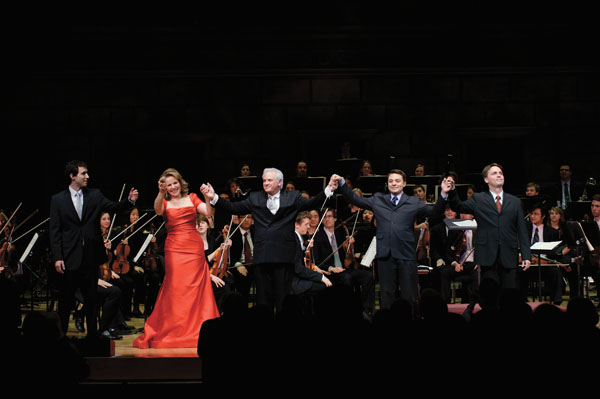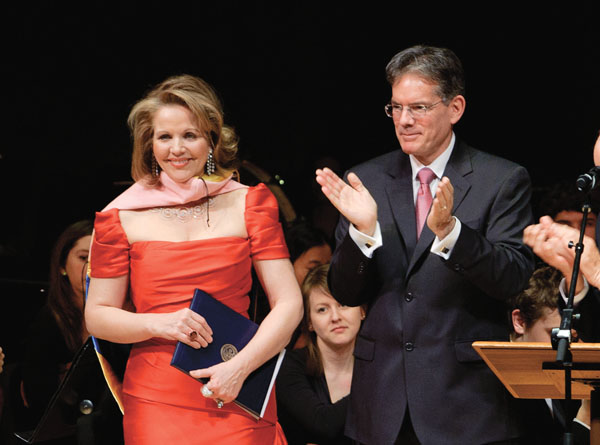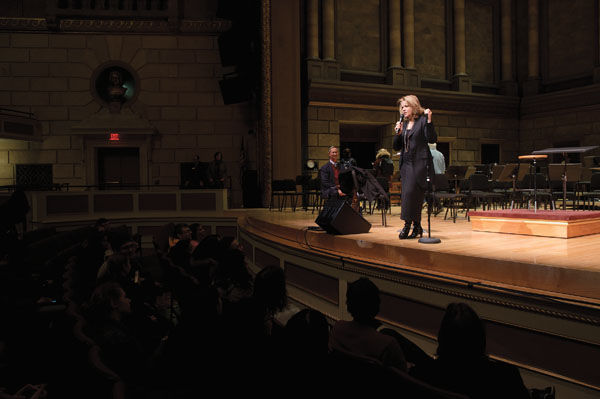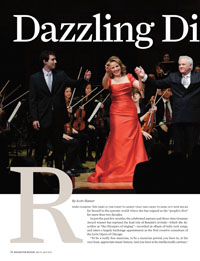Features
 BRAVA! Fleming acknowledges the audience at Kodak Hall with Neil Varon, director of the Eastman Philharmonia (third from left),
and graduate student tenors Joshua Bouillon, Matthew Grills, and Eric Rieger. (Photo: Brandon Vick)
BRAVA! Fleming acknowledges the audience at Kodak Hall with Neil Varon, director of the Eastman Philharmonia (third from left),
and graduate student tenors Joshua Bouillon, Matthew Grills, and Eric Rieger. (Photo: Brandon Vick)Renée Fleming ’83E (MM) is the first to admit that she likes to seek out new roles for herself in the operatic world where she has reigned as the “people’s diva” for more than two decades.
In just the past few months, the celebrated soprano and three-time Grammy Award winner has reprised the lead role of Rossini’s Armida—which she describes as “the Olympics of singing”—recorded an album of indie rock songs, and taken a largely backstage appointment as the first creative consultant of the Lyric Opera of Chicago.
“To be a really fine musician, to be a musician period, you have to, at the very least, appreciate music history. And you have to be intellectually curious,” the Eastman School graduate says. “I have very eclectic tastes. It’s what I enjoy.
“Growing up in Rochester had a lot to do with that because there was so much to appreciate, and being in a family that was all about the arts sort of set me up for this.”
“This” is stardom that’s almost operatic in its own right. Since winning the Metropolitan Opera auditions in 1988 and making her Met debut in 1991, Fleming has captivated the world’s most discerning listeners with a full lyric soprano voice that fans and critics alike describe as rich, creamy, and extraordinary.
“In my long life, I have met maybe two sopranos with this quality of singing,” the legendary conductor Sir George Solti famously told the New York Times about his first encounter with Fleming’s voice. “The other was Renata Tebaldi.”
 GUEST OF HONOR: As part of her visit to the Eastman School, Fleming received an honorary degree from Douglas Lowry, dean of
the school. (Photo: Brandon Vick)
GUEST OF HONOR: As part of her visit to the Eastman School, Fleming received an honorary degree from Douglas Lowry, dean of
the school. (Photo: Brandon Vick)In February, Fleming helped set the stage for the next generation of opera performers as she shared her talents with her alma mater for a concert to benefit the new Renée Fleming Endowed Scholarship Fund for Eastman voice and opera students.
The three-hour performance, which left a packed Kodak Hall at Eastman Theatre clamoring for more, was a rare opportunity for students, faculty, and other members of the University and Rochester communities to get a glimpse of why Fleming is acclaimed for her voice as well as for transforming the popular image of opera stars. Performing with Eastman’s premier student orchestra, the Eastman Philharmonia, conducted by the Philharmonia’s music director Neil Varon and Eastman School Dean Douglas Lowry, she moved effortlessly from the arias and art songs of Strauss and Puccini to the contemporary songs of the alternative rock bands Muse and Death Cab for Cutie.
“Renée Fleming’s career has served as an exemplar of refined musical expression, exquisite taste, and courageous adventure,” says Lowry. “Her preeminence in the operatic and recital world is unmatched, featuring a broad repertoire that melds traditional and unfamiliar.”
For Fleming, the benefit was a homecoming that “was a long time in the making”—“Nothing in my schedule is spontaneous,” she notes—and her first visit since the renovation of Kodak Hall and the opening of Eastman’s new East Wing. The native of the Rochester suburb of Churchville, N.Y., earned a master of music degree from Eastman, studying with legendary voice professors Jan DeGaetani and John Maloy.
“The most important thing, and the thing that separates Eastman from other conservatories, is that it’s an academically oriented school,” Fleming says. “I’m proud of that association because the musicology and theory and analysis classes that I took at Eastman set me on a path that’s a little bit different from other singers. It piqued my interest in composers and how they fit together and into their various schools of thought.”
The daughter of voice teacher Patricia Alexander, who has taught at the Eastman Community Music School for 14 years, Fleming grew up in a household of wide-ranging musical interests as well as opera and choral performances. She was already intrigued by song literature when she arrived at Eastman.
“That’s different from most singers who specialize in opera,” she says.
As the guest of the Eastman School, she made a point of ensuring that she would have time to perform with and meet with students. In addition to working with the Phiharmonia, during her encore, she waltzed with graduate student tenors Joshua Bouillon, Matthew Grills, and Eric Rieger.
She says students are often surprised at how difficult her climb to the heights of the operatic world were, a process that she recounts in her 2004 memoir, The Inner Voice: The Making of a Singer.
 INTERACTIVE SESSION: Following her rehearsal with the Eastman Philharmonia, Fleming talked with students about her career
during a session in Kodak Hall at Eastman Theatre. (Photo: Brandon Vick)
INTERACTIVE SESSION: Following her rehearsal with the Eastman Philharmonia, Fleming talked with students about her career
during a session in Kodak Hall at Eastman Theatre. (Photo: Brandon Vick)“People have an expectation, I think, that you have this talent, and so you go to college for four years and you’re ready to go,” she says. “It was such a longer, more arduous road for me.
“I think kids generally imagine that they’re going to achieve everything,” she says. “And I think it’s only experience that begins to seize you and to teach you that maybe everything is not attainable. But I think it’s a mistake when you’re a kid to think, ‘Well, I’ll never make it.’ That’s precisely the time to think, ‘Well, of course, I’m going to be singing at the Met.’”
Her visit to Eastman coincided with the Metropolitan Opera’s production of Armida, the three-act Rossini opera known for the difficult coloratura that’s the signature of the lead character, an enchanting sorceress who seduces a Crusader who’s encamped near Jerusalem. It’s a role Fleming first tackled in 1993 at the Rossini Opera Festival in Pesaro, Italy.
“It’s the Olympics for singers,” Fleming says of the role. “Anything that’s bel canto is the hardest, most virtuosic expression of what a singer does.”
As for the challenge of moving from the Met to Kodak Hall in almost back-to-back performances, “It’ll be easy,” she joked a few days before Armida’s opening night.
The day after Armida’s debut, she was on the stage at Kodak Hall, preparing for rehearsal.
“In case you’re wondering why I sound like a bass today,” she told the small group of students who had gathered to listen as she ran through the concert with the Philharmonia, “it’s because I normally take two days off.”
Musical Ambassador
One of the most acclaimed singers of the modern era, Fleming has been internationally celebrated by arts and cultural organizations. Among the honors she has received:
- Sweden’s Polar Prize (2008);
- Chevalier de la Légion d’Honneur from the French government (2005);
- Honorary membership in the Royal Academy of Music (2003);
- Three Grammy Awards, including most recently the 2010 Best Classical Vocal Performance Grammy for Verismo, a collection of rarely heard Italian arias;
- The 2009 Echo Award for Strauss’s Four Last Songs;
- The first woman in the 125-year history of the Metropolitan Opera to solo headline an opening night gala.
She’s frequently called upon to help commemorate distinguished occasions, including the 2008 Olympic Games in Beijing, the 2009 inauguration of President Barack Obama, and the 2009 anniversary of the Czech Republic’s “Velvet Revolution.”
Finding the time to take those precious days off has become something of the holy grail for Fleming. After her Rochester performance, she returned to New York to finish Armida’s run. Later this spring, she takes the stage at the Met to headline Strauss’s diva showcase, Capriccio. Her 2010–11 season also included performances for the BBC Symphony Orchestra’s Last Night of the Proms as well as performances with the Pittsburgh, St. Louis, and National symphonies, recitals in St. Paul, Minn., Kansas City, Mo., Ann Arbor, Mich., Montreal, Washington, D.C., New York, San Juan, Berlin, Budapest, and Warsaw.
She also is frequently asked to host television and radio broadcasts, including the Metropolitan Opera’s Live in HD series for movie theaters and television, and Live From Lincoln Center on PBS.
“The biggest challenge I face is probably finding balance,” says the mother of two teen-aged daughters.
Whether she’s found the magic formula of professional and personal balance is a question, too, that’s frequently asked of Fleming. Her answer? “Less is more, but I never seem to achieve it.”
Fleming hopes to get a different perspective on the opera world in her new role as creative consultant to the Lyric Opera of Chicago. She’s the first person to serve in that position in the celebrated company’s history.
As part of the five-year appointment, Fleming will play an active leadership role in “creating new projects and initiatives designed to increase opera audiences and awareness of the art form, while sharing in the company’s artistic vision,” the Lyric Opera noted in making the announcement.
Among her charges are helping to foster a commitment to American music theater, beginning with a new production of Rodgers and Hammerstein’s Oklahoma! in 2013, and curating a world premiere opera in the 2015–16 season.
“I love the idea that I can learn about some other part of what I do,” Fleming says of the Chicago appointment. “Be backstage and get some sense of how the business of music is run and get some sense of what the challenges are. “I’ve always been interested in outreach and marketing. And it’s going to be terrific to try to be involved in that.”
The move adds a new component to her already brimming program as an artist whose performances on stage and in the recording studio and whose commitment as a musical ambassador have come to define the modern notion of opera superstar.
That’s a role that may be timeless.
“I don’t know what the future is going to bring,” Fleming says. “I hope it’s a few years off.”

